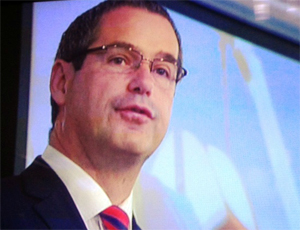Telstra wireless ads still controlled: Conroy

Although the competition watchdog struck out clauses banning wireless promotion in the National Broadband Network Company's (NBN Co) contracts with Telstra and Optus, Communications Minister Stephen Conroy has said that he believes nothing will change.

Stephen Conroy
(Credit: Josh Taylor/ZDNet Australia)
Following the submission of Telstra's structural separation undertaking (SSU), it was revealed that the Australian Competition and Consumer Commission (ACCC) had sought to remove a clause in Telstra's $11 billion agreement with NBN Co that would have prevented it from promoting wireless as a substitute for NBN services.
In response to a question from press-gallery journalists after his speech at the National Press Club in Canberra today, Conroy said that a new clause has replaced the former wireless-promotion clause with one that mirrors the false and misleading advertising section of the Trade Practices Act, which would prevent the telcos from launching ads claiming wireless to be faster than fibre.
"[It] ensures people can't try to pretend about the capacities of wireless or HFC," he said. "Ultimately, I think the NBN Co board are comfortable and confident in how the contract is now written."
Conroy's speech focused sharply on the policy proposals discussed by Shadow Communications Minister Malcolm Turnbull that began with his own address to the National Press Club in August. Conroy compared the policy to the coalition's approach to climate change.
"The strategy has three simple steps: first, they say there isn't a problem; second, they say the government's proposal won't work, or is too expensive; finally, they propose a plan that fails to deliver for our future needs," he said.
Conroy first targeted Turnbull's claims that 12 megabits per second (Mbps) download speeds were enough for Australians. He pointed to charts showing that download speeds have increased between 25 to 35 per cent every year for the past two decades, and said that the exponential growth is set to continue.
"Just as dial-up rapidly became insufficient for our needs, so too will copper-based technologies become insufficient very soon," he said.
Conroy said that mobile networks would also have an important role to play in the future, but he sees this as complementary to fixed-line broadband networks.
On Turnbull's recent claims that the NBN will cost upwards of $50 billion, Conroy said that Turnbull is confusing capital expenditure with operating expenses.
Conroy also mocked Turnbull's claim that prices for services would be higher than broadband services today, pointing to announcements by various retailers that put higher-speed NBN services on par with ADSL services available today.
The communications minister ripped into Turnbull's own proposal for a mix of technologies, including hybrid fibre-coaxial (HFC), fibre to the node (FTTN) and wireless. Conroy said that the proposed 60Mbps speeds are only achievable using bonded copper pairs, which don't exist in every connection in Australia. He added that a coalition government would waste billions on technology for FTTN that would be useless when upgrading to fibre to the home (FTTH).
"A cost-effective roll-out of FTTN does not provide an efficient upgrade path to fibre to the home," he said. "It is not a simple matter of building fibre part of the way to the home, and then building the rest later."
Using the HFC networks built by both Telstra and Optus would not be appropriate, either, Conroy argued, as the cable is a shared medium.
"The more people using it in your street, the slower it gets. When people start 'hogging' the available capacity, there's not enough to go around."
The minister said that his shadow counterpart is "planning a network that will be obsolete by the time it is built", and one that is uncosted. He pointed to the $16.7 billion figure from CitiGroup, first revealed by ZDNet Australia, and noted that it didn't even factor in convincing Telstra to structurally separate its wholesale and retail arms.
"The fact is, Telstra has never contemplated voluntary structural separation without an incentive," he said. "We are left to trust that Mr Turnbull's own skills of persuasion will right the structural wrong left by the Howard Government."
Conroy said that the coalition has three conflicting policies; Turnbull's plan is in conflict with Opposition Leader Tony Abbott's comments that wireless is surpassing fibre, while the Nationals are calling for 50 per cent of regional Australia to be covered by FTTH.
He closed the speech by quoting Liberal Party icon Sir Robert Menzies as he called for Australia to "be proud of big enterprises" and big ideas, as the government embarked on the Snowy Mountains Scheme in 1958.
"The NBN is the big idea for our time," Conroy said.